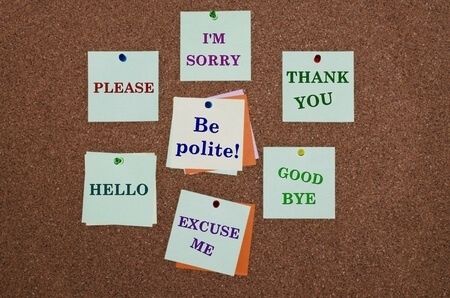 Far from being an outdated, quaint throwback, manners are still in vogue at work. “Please” and “thank you” go a long way towards greasing the cogs of social interaction in the workplace. You might be skeptical of my claim, given our country’s current election cycle. But look past the soundbites of the 24/7 news cycle, and you’ll find that people want to work for leaders who are civil.
Far from being an outdated, quaint throwback, manners are still in vogue at work. “Please” and “thank you” go a long way towards greasing the cogs of social interaction in the workplace. You might be skeptical of my claim, given our country’s current election cycle. But look past the soundbites of the 24/7 news cycle, and you’ll find that people want to work for leaders who are civil.
Believe me, people are watching how their leaders treat others. If you think a rude brush-off doesn’t matter, or that “they’ll get over it,” you’re sorely mistaken. There’s a very real, measurable impact on employee productivity when there’s incivility in the workplace. Georgetown University associate professor of management Christine Porath has studied the effects of workplace incivility for many years. She has found that people reduce their work effort—by a significant amount—when their leaders treat them rudely.
I attended Porath’s breakout session, “Civility: Do We Have Time to be Nice at Work?” at the 2016 WorkHuman conference. She presented fascinating information regarding workplace incivility, including these statistics:
People who experience incivility in the workplace:
- Are 5 times less likely to notice details
- Perform 17% worse on cognitive tests
- Take longer to make and record decisions
- Make more errors
There are other reasons to stop being a jerk at work, as I write in my latest Smartbrief article. Porath’s research finds that what people want most from their leaders is respect. They want this more than even the often-cited recognition and appreciation.
So just like your mama taught you: manners matter. Simple courtesies like waiting your turn, saying you’re sorry and listening to others can have a big impact on your leadership effectiveness.
Copyright: sabinezia / 123RF Stock Photo
Leave a Reply